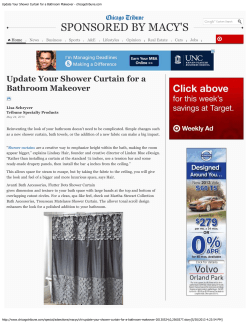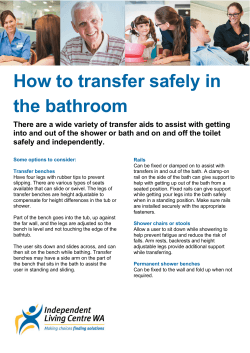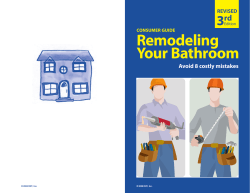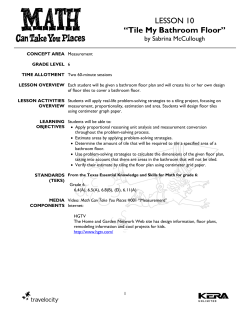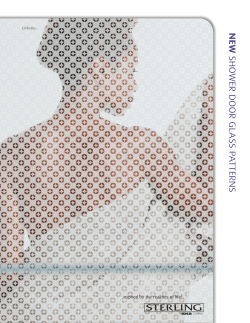
What Universal Design can mean for you. Website
Website Facts on Falls Easier Living Support & Community Where to Find Us What Universal Design can mean for you. June 2011 What is Universal Design and how can it be incorporated into your home? Read below to learn how this increasingly popular design concept has become mainstream. In This Issue Please forward this newsletter onto someone you know that would like to learn more about this subject. How Universal Design is Incorporated in Bathrooms What is Universal Design? What is Universal Design? Featured Product Universal design is a framework for the design of places and products benefiting the widest possible range of people in the widest range of situations without the need for special or separate design. When homes and products used in the home are designed with everyone in mind, there is less need for expensive redesign and renovation of the space and more equitable use of products in the home. With the increasing population of people with disabilities and an aging population, the need for features that allow people to age in place and have as much independence as possible in their homes is growing. Universal design features aim at creating more access, convenience, safety. Universal design is also being applied to the design of technology, instruction, services, and other products and environments. Such examples include: curb cuts or sidewalk ramps, color-contrast dish ware with steep sides that assist those with visual or dexterity problems, cabinets with pull-out shelves, kitchen counters at several heights to accommodate different tasks and postures, and amidst many of the world's public transit systems, low-floor buses that "kneel" (bring their front end to ground level to eliminate gap) and/or are equipped with ramps rather than on-board lifts. According to the Center for Universal Design at North Carolina State University, the principles of Universal Design are: 3M™ SafetyWalk™ SlipResistant Tub and Shower Strips This fine-textured, slip-resistant material helps provide enhanced safety and comfort in light traffic barefoot areas. To learn more click here. 1. 2. 3. 4. 5. 6. 7. Equitable use Flexibility in use Simple and intuitive Perceptible information Tolerance for error Low physical effort Size and space for approach and use For a list of selected Web sites where you will find information on topics related to Universal Design, click here. source: Universal Design Trends w ill Redefine Decorative Plumbing and Hardw are by Rosemarie Rossetti, Ph.D. and Wikipedia.org How Universal Design is Incorporated in Bathrooms. There are plenty of opportunities for accidents in the bathroom; in fact, the National Safety Council estimates that nearly 300,000 people are injured in the bathroom every year. Also consider that according to a pilot study performed by Strategies and Actions for Independent Living (SAIL), 58% of falls happen in the home of which 13% occur in the bathroom. Universal design features can help make your bathroom a safer and more functional place, whether it's a bathroom for one or a community space that is used by children and parents. For those with disabilities, Universal Design can create a bathroom with ample room to maneuver while placing fixtures at appropriate heights. Can Universal Design be stylish? Yes, according to Universal Design specialists Mary Jo Peterson, author of Universal Kitchen and Bathroom Planning: Design that Adapts to People. She explains that it is important that style does not take a backseat to functionality when it comes to incorporating Universal Design. "One of the basics rules of universal design is if it doesn't look good, it won't work," said Peterson, a certified kitchen and bath designer and president of Mary Jo Peterson, Inc.-a firm that is widely recognized for its work in Universal Design. Today many major manufacturers have developed lines of Universal Design products that can match the decor of most bathrooms. "Many new Universal Design products look more like luxury and comfort items instead of assisted design," says Peterson. Can you incorporate Universal Design without doing a full remodel? Even if you are not redesigning your bathroom, you can purchase certain safety products that will make the tub, shower and toilet safer and easier to use for people of various ages. Many of these products are easy to install and can be purchased at affordable prices. Below is a list of design and product suggestions for a home bathroom that can increase safety, comfort, convenience, and livability for everyone. 36-inch-wide door for easy access, or pocket door Rocker-style light switches, 42 inches off the floor Lever handle, anti-scald faucets on sink, bathtub, and shower No threshold walk-in or roll-in shower with minimum dimensions 5 feet by 3 feet (4 feet preferred) Hand-held, adjustable-height showerhead with easily operable controls Maneuvering space that accommodates a 60-inch turning radius Toilet centered 18 inches from any side wall, tub, or cabinet Toilet seat 17 to 19 inches off floor for older persons, lower for children Grab bars or wall-blocking for future installation in tub, shower and near toilet Knee space under sink for seated users Easy-glide drawers that close automatically Countertops with rounded edges Bright, non-glare lighting Reduced-slip tile or non-skid floor source: ibaths.com, AARP.org What about Falls and Universal Design? As I think about Universal Design and Fall Prevention I reflect back upon the Universal Summit in St. Louis that Bill and I attended last year. The conference was dedicated to expanding the knowledge and application of UD concepts to many disciplines. We toured homes, senior living centers, neighborhoods and urban parks all designed with universal design elements. Attendees included architects, planners, designers, clinicians and other disciplines all interested in enhancing style and functionality for comfortable, safe and independent living. We saw how Universal design can seamlessly be incorporated into all living space. It truly does make your house a warm and welcoming home for you, your family and all those who visit. Many of the basic concepts are synergistic with fall prevention: No-step entry - enhances the ability to enter and exit the home without stepping up or down, minimizing trip hazards and making it easier for people limited mobility. We toured homes where it was designed as a gently sloping entranceway, beautifully landscaped and aesthetically pleasing. Wide pathways - preferably 42 inches wide to allow for greater ease of movement within the home. Open, noncluttered pathways minimize a risk for falls. This clear open space can be both elegant and functional. An open floor plan bathroom on the floor with the no-step entry. Consider a 5 ft diameter open area (accommodate a wheelchair, scooter or another person), a shower that's easy to enter, anti-slip mats or strips in the tub and/or shower and a chair to sit if you become tired or need it while dressing. Enhanced Lighting - Last month we talked about the importance of lighting in fall prevention. Use of natural and electric lighting - accessible and abundant is the key! So when you think about fall prevention, it only makes sense to think about Universal Design! Fall Prevention Services goal is to help you begin to make fall prevention a part of your everyday life. We help you identify risks for falls through education, strength building and assessments so that you can continue to live comfortably, independently and safely in your home. Fall Prevention Services provides advice to individuals, families, architects, builders and remodelers for safe, comfortable, independent living in your home or where you chose to live. Our consultants are Certified Aging in Place Specialists (CAPS), trained on the changing needs of individuals as they live independently in their homes. For more information about Fall Prevention Services visit www.fallpreventionservices.com or call 515-991-3653. Sincerely, Bill Kerrigan, CAPS Betti Kerrigan, CAPS Fall Prevention Services This new sletter is intended for informational purposes only. Nothing contained in this new sletter is or should be considered or used as a substitute for medical advice, diagnosis or treatment. This new sletter and its services do not constitute the practice of medical, nursing or other professional health care advice, diagnosis or treatment. Any reference to products in articles or the feature column is not an endorsement of the product. © 2010 Fall Prevention Services Fall Prevention Services...Livability, Independence, and Fall Prevention Services
© Copyright 2025

